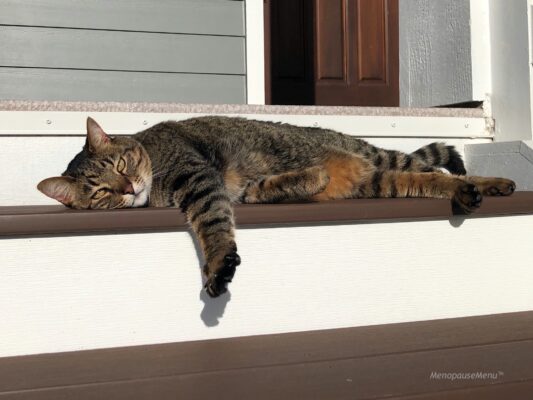We’ve all been there before. You are in a small hotel room and adjust the thermostat upwards because it is too cold, only to rush over to the controls and reduce the temp when the room is suddenly too hot 30 minutes later. Well, imagine the same scenario playing out in your body but in just 3 seconds, not 30 minutes. Bam! You’ve just had your first hot flash.

What provokes hot flashes?
Hot flashes usually last anywhere from 2-4 minutes and commonly occur related to these situations:
- Drinking hot liquids (coffee, tea, hot water)
- Drinking alcohol
- Eating spicy foods
- Taking a hot shower
- When stressed, excited, anxious
- When overly physically active
- When overdressed or wearing tight-fitting clothes
- As a side effect of some medications
- Indicative of other diseases (carcinoid, pheochromocytoma, POTS, certain cancers)
What is actually going on during a hot flash?
In basic terms, the small blood vessels near the skin surface are dilating, which causes heat release and flushing. This is most common in the chest, neck and face areas, but can also be a global sensation. Perspiration can be mild (dew) or significant (rivers of sweat). Why does this even happen? As estrogen levels drop in perimenopause, changes in the hypothalamus in our brain cause thermoregulatory dysfunction. The thermoneutral zone is narrowed in people who have hot flashes (from Am J Med. 2005;118 Suppl 12B:124), meaning that just a slight increase in core body temperature promotes a hot flash. You may be conjuring up an episode of Star Trek right about now…
Even more unnerving than a sudden hot flash is the shivering cold sensation right afterwards. This is the body’s attempt to restore core temperature to normal and sometimes this can actually be more uncomfortable than the hot flash itself. How can one feel burning hot and freezing cold almost simultaneously? If this sounds as confusing as “how much wood would a woodchuck chuck” you are right…kind of makes one feel a bit crazy!
Is obesity a risk factor?
Obesity is actually a risk factor for hot flashes, even though obese people have higher levels of estrone in their body tissues. To learn more about this and about other risk factors for postmenopausal hot flashes in general, you can read this informative research article Persistent Hot Flushes in Older Postmenopausal Women (from Arch Intern Med. 2008;168(8):840-846. doi:10.1001/archinte.168.8.840). Is this just one more reason to try to lose weight? Not exactly, but if you are trying to better regulate your metabolism and possibly lose a few pounds, you can link to lots more content about weight management here.
Treatment Options
How do you treat hot flashes?
That is the $64K question! The knee jerk answer is to minimize or avoid the situations listed above; however, it is nearly impossible to avoid a hot shower, have an absent physiologic stress response, and (especially in Seattle) avoid all hot drinks. Treatment is different for every person and sometimes multiple different approaches are needed to get to a tolerable state. The following list of treatment categories is not all inclusive but serves more as a guide to common techniques.*
- Behavior modification
- AKA – minimize or avoid the situations listed above!
- Supplements and herbal remedies
- Evening primrose oil (borage oil), black cohosh, Chinese herbs
- Prescription medications (non-hormone)
- Selective antidepressants, gabapentin
- Hormone replacement therapy
- Estrogen +/- progesterone (enjoy watching this 40 minute Menu for Change lecture video by Dr. Holly Sato, OB/GYN: “Menopause: Hormones and Beyond”)
- Acupuncture
- Cognitive Behavioral Therapy
- Mindfulness-based stress-reduction (Kira Baum, ND EAMP is a great resource)
- Hypnotherapy (Kate Wells, CH is wonderful)
* It is important to discuss these ideas with your personal physician as the nuances of individual treatment go far beyond this blog review.
Back to the hotel room scenario – if you ever suddenly need to rip off your clothes in seconds flat, you’ll get lots of practice if you are going through menopause. Personal lube? Now that’s another blog post!

You might be interested in: Night Sweats, HRT
Disclaimer: All information on MenopauseMenu™ website does not constitute personal medical advice and should not take the place of medical advice from your own physician. This information is also not attributed to The Polyclinic, OptumCare or UnitedHealth.